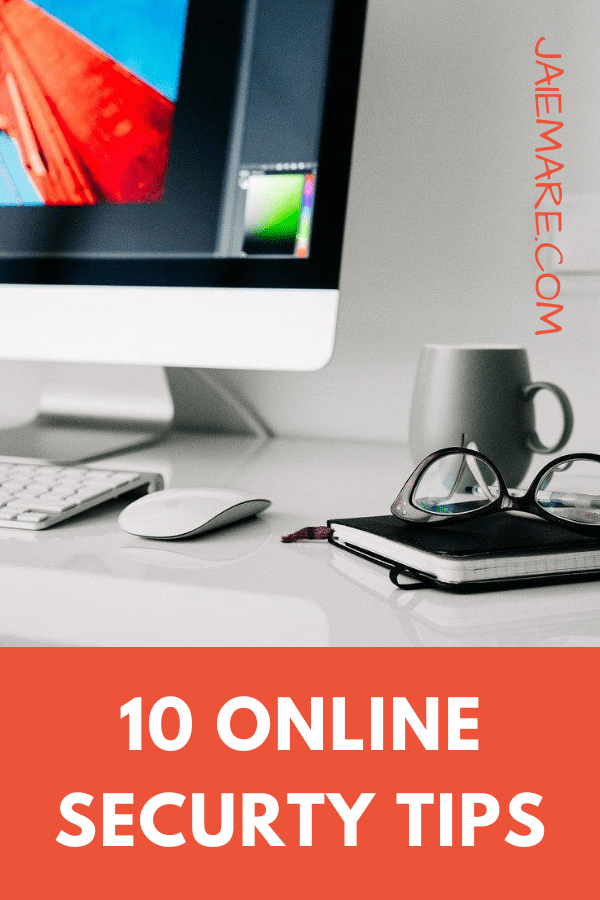10 ONLINE SECURITY TIPS

With more individuals working from home, keeping your sensitive information and data protected and secured takes priority.
Just because a company allows employees to work remotely, it doesn’t mean the company you work for has the information technology staff or technical infrastructure to keep your personal information safe, keep your computer protected and updated, or stop a data breach in real-time by hackers attempting to access your information.
Issues concerning the security of electronic systems, devices, and information and ways to protect against denial-of-service (DoS) attacks are critical to maintaining password hygiene and strengthening internet security.
Threats
Malicious code threats consisting of viruses, worms, and trojan horses can be installed on your computer and hidden without your knowledge, which creates a backdoor for attackers to access your personally identifiable information (PII).
Phishing, spear phishing, and social engineering threats use e-mail or website to solicit information by targeting a specific organization or group and seeking unauthorized access to confidential data through e-mail spoofing.
Using the same email and password for all of your online accounts makes it easy for hackers to access your online accounts. Avoid using dictionary words, your social security number, birth date, names, or information posted on your social media (i.e. name of a pet or bank vendor) as passwords.
Check out this list of commonly used passwords.
Using free WiFi networks (i.e. airport, coffee shop, hotel, shopping center) may sound like a great idea to save a few dollars, but you don’t when the last time the company or vendor last changed their password.
Some places have the password posted on an information board or at the checkout counter for anyone to access.
Depending on the strength of a WiFi signal, it’s easy for an individual to sit in his/her car, exploit connections, and steal your login information to clean out your bank account.
Personally Identifiable Information (PII)
PII is any information maintained by a company that can be used to link or trace an individual’s identity. Examples of PII:
- Name
- Address
- Social security number
- Email address
- Date of birth
- Driver’s license number
- Phone number
- IP address
- Financial, employment, or location data

Combining two types of PII, such as a person’s name with a birth date, identity thieves have all they need to commit identity theft and ruining your credit.
Protection of both work and personal information on your computer, mobile devices, or company-issued equipment can help to prevent attacks by putting to practice these ten online security tips.
Protecting Yourself
- u003cliu003eMaintain and use anti-virus software and firewalls. u003c/liu003eu003cliu003eUse webcam stickers dots or sliders to prevent hackers from accessing your personal information on social media and spying through the camerau003c/liu003eu003cliu003eCreate long and strong passwords consisting of a combination of numbers, symbols, upper and lowercase letters.u003c/liu003eu003cliu003eInstead of using free public Wifi at a hotel, use a pocket WiFi or hotspot on your smartphone when traveling.u003c/liu003eu003cliu003eCreate a secure connection while visiting a website, conducting online banking transactions, and accessing business networks and shared drives over the Internet by using a virtual private network (VPN). A VPN is a service that hides your IP address encrypts all the data you send and receive through internet traffic and protects your online identity, making it impossible to read by anyone who intercepts it. If you need to use free public WiFi at a coffee shop, you need to secure your device with a u003ca href=u0022https://go.nordvpn.net/aff_c?offer_id=15u0026amp;aff_id=33152u0026amp;url_id=902u0022 class=u0022rank-math-linku0022u003eVPNu003c/au003e.u003c/liu003eu003cliu003eAn open network allows hackers to sniff web traffic, send fake ads or links to click on which contain viruses. Encrypt data on your network.u003c/liu003eu003cliu003eBack up your data.u003c/liu003eu003cliu003eKeep software up to date.u003c/liu003eu003cliu003eDo not store usernames or passwords in a spreadsheet. Use a password manager app to store passwords on computers and other devices. Password manager apps are a great tool to use to generate strong passwords. u003c/liu003eu003cliu003eAdd a layer of security by installing u003ca href=u0022https://www.techrepublic.com/article/two-factor-authentication-cheat-sheet/u0022 class=u0022rank-math-linku0022u003etwo-factor authenticationu003c/au003e to your technological devices and online accounts. The two-factor authentication app will generate a code.u003c/liu003e
Now that you know what you need to know about safeguarding your sensitive information, protecting your computer and it’s contents, whether it’s working from home, on vacation, or enjoying a pumpkin spice latte, is the same as locking your door when you leave the house.
One last tip, never leave your computer unattended and change your passwords regularly to keep the bad guys out.
<script> __ATA.cmd.push(function() { __ATA.initDynamicSlot({ id: 'atatags-1608172891-67362ce604d61', location: 120, formFactor: '001', label: { text: 'Advertisements', }, creative: { reportAd: { text: 'Report this ad', }, privacySettings: { text: 'Privacy settings', onClick: function() { window.__tcfapi && window.__tcfapi('showUi'); }, } } }); }); </script>
Reply